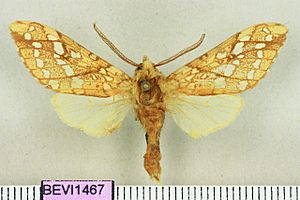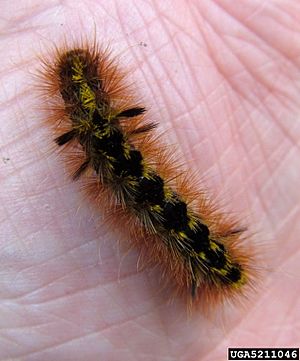Silver-spotted tiger moth facts for kids
Quick facts for kids Silver-spotted tiger moth |
|
|---|---|
 |
|
 |
|
| Scientific classification |
|
| Kingdom: | Animalia |
| Phylum: | Arthropoda |
| Class: | Insecta |
| Order: | Lepidoptera |
| Superfamily: | Noctuoidea |
| Family: | Erebidae |
| Subfamily: | Arctiinae |
| Genus: | Lophocampa |
| Species: |
L. argentata
|
| Binomial name | |
| Lophocampa argentata (Packard, 1864)
|
|
| Script error: The function "autoWithCaption" does not exist. | |
| Synonyms | |
|
|
Script error: No such module "Check for conflicting parameters".
The silver-spotted tiger moth, known scientifically as Lophocampa argentata, is a type of moth. It belongs to the Erebidae family. A scientist named Packard first described this moth in 1864. You can find these moths in western North America. Their range stretches from British Columbia down to southern California. They also live east into states like Arizona, Nevada, New Mexico, Colorado, Utah, and Wyoming. It's possible they also live in northern Mexico.
Contents
Meet the Silver-Spotted Tiger Moth
The silver-spotted tiger moth gets its name from its look. It has special markings that might remind you of silver spots. Like other "tiger moths," it often has bright patterns. These patterns can help warn predators that the moth might not taste good. Moths are insects with wings, similar to butterflies. They are usually active at night.
Where Silver-Spotted Moths Live
These moths are found across a large part of western North America. They prefer areas with lots of trees. This is because their young, called larvae or caterpillars, need specific plants to eat. Their habitat includes forests and woodlands.
Life Cycle and What They Eat
The life of a moth starts as an egg. The egg hatches into a larva, which is a caterpillar. These caterpillars are very hungry! They eat leaves from many different plants. One of their favorite foods in western North America is the Douglas fir tree. The caterpillars grow by eating and then turn into a pupa. Inside the pupa, they change into an adult moth. The adult moth then lays eggs, and the cycle begins again.
Different Kinds of Silver-Spotted Moths
Sometimes, animals of the same species can have slight differences. These groups are called subspecies. The silver-spotted tiger moth has two known subspecies:
- Lophocampa argentata argentata
- Lophocampa argentata subalpina (French, 1890)
The subalpina subspecies is found in the Rocky Mountains, especially in Colorado. These small differences often depend on where the moths live.

